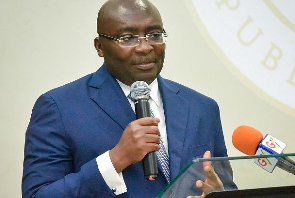- Home - News
- TWI News | TV
- Polls
- Year In Review
- News Archive
- Crime & Punishment
- Politics
- Regional
- Editorial
- Health
- Ghanaians Abroad
- Tabloid
- Africa
- Religion
- Election 2020
- Coronavirus
- News Videos | TV
- Photo Archives
- News Headlines
- Press Release
General News of Friday, 27 January 2023
Source: ghanaiantimes.com.gh
Develop solutions needed to deepen intra-African trade – Bawumia
Vice President, Dr Mahamudu Bawumia, has charged Africa’s political and business leaders to develop signature solutions needed to deepen intra-African trade, spur impactful investments and bring prosperity to the continent.
Opening the maiden edition of the Africa Prosperity Dialogues (APD), at Adukrom, in the Eastern Region, he pointed out three main areas that needed attention to bring Africa’s desired transformation.
They are smart investments in critical infrastructure, unleashing of productive capacities across the continent, and mobilisation of finance and investments to bridge the infrastructure gap and generate sustainable growth.
“As key stakeholders, we must consolidate the successes so far and, with a sense of urgency, develop the signature solutions needed to deepen intra-African trade and spur impactful investments needed to bring prosperity to the continent and its people. And we must do this with fearless determination,” Dr Bawumia said.
Dubbed the Kwahu Summit, the first of the annual dialogues, is a three-day event has brought together Africa’s political and business leaders to discuss intra-Africa trade, with a focus on the Africa Continental Free Trade Area (AfCFTA).
It is under the theme “AfCFTA: From Ambition to Action, Delivering Prosperity through Continental Trade”.
“The time has come for Africa and Africans to define our own narrative. Africa can no longer allow poverty and underdevelopment to be the destiny of her peoples, being a continent so blessed with every natural resource imaginable oil, gas, minerals, and sunshine,” Dr Bawumia said.
On the smart investments in critical infrastructure, he said the continent needed to produce and trade its way out of poverty and underdevelopment by looking for additional resources to finance the ‘arteries for trade’.
These arteries, he said included the physical infrastructure such as roads, rail, and energy; digital infrastructure such as data centres to facilitate the digital transformation and financial infrastructure for integration of financial markets, which would be critical to delivering the success of the AfCFTA.
On productive capacities, he advocated the creation of platforms for knowledge brokerage and access to information on critical products and services on the continent to allow 445 million small businesses across the continent to plug into the value chains of these mega industries.
“We need to develop Africa into a manufacturing zone that will facilitate the trade of value-added products. These, in my view, will be critical to leapfrog Africa’s industrialisation and the enormous socio-economic benefits,” he said.
For finance and investments, he said Africa needed to mobilise between $ 130 billion and $ 170 billion annually to bridge its infrastructure gap and generate sustainable growth at five per cent per annum or more.
“This presents immense opportunities for private sector investment. Attracting private sector participation through Public-Private Partnerships (PPPs) is therefore essential for the delivery of various infrastructure projects.
“There is a need for innovative policies to mobilise and allocate resources more effectively, and for better coordination amongst all African stakeholders and international partners,” the Vice President indicated.
The AfCFTA Secretary-General, Wamkele Mene, said Africa’s challenges were great opportunities for the continent to exploit in order to speed up its long-awaited development.
He urged participants of the dialogues to dig deep into their thoughts and proffer effective ways and policies that the AfCFTA can fall on in order to achieve the objectives of AfCFTA.
The Founder and Chairman of the Africa Prosperity Network, Gabby Asare Otchere-Darko, on his part, observed that AfCFTA, promises economic integration hence its success would be the collective success of the continent.
“AfCFTA’s success is our (Africa’s) success. If it works, it will boost significantly trade and investments, provide jobs and increase prosperity across the continent, like never before,” he said.
In order for it (AfCFTA) to succeed, Mr Otchere-Darko said the workings of the AfCFTA should be seen and felt by the people and for African businesses collectively own and benefit from it.
“The combined voices of Africa’s businesses, big and small, must be heard and felt. The aggregate value of enterprises and industries across Africa must be networked, coordinated, and impactfully leveraged,” Mr Otchere-Darko posited.
Sports

West Ham manager David Moyes counting on Mohammed Kudus, other players to overcome Leverkusen
Business








